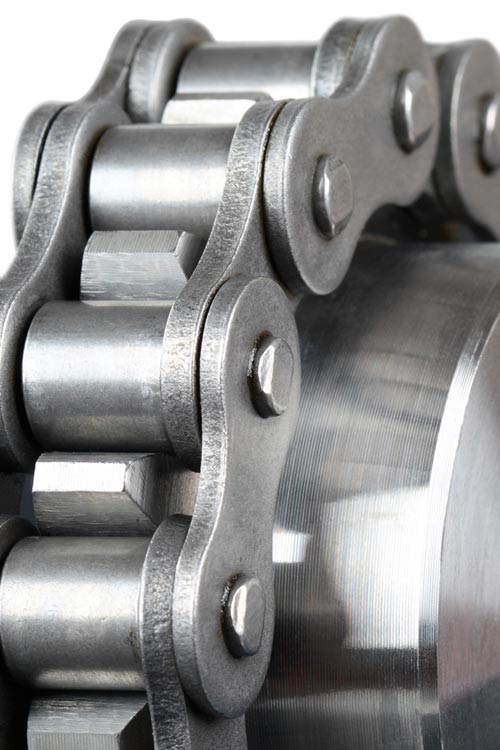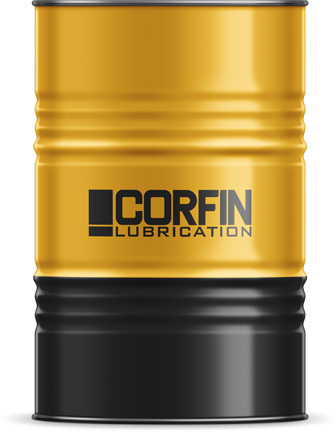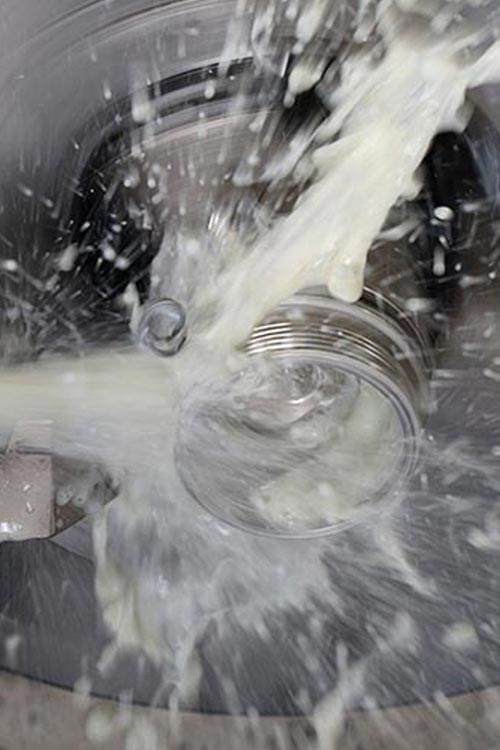SKU 80400
Category Oils
High Temperature Chain Oil
ZET 22/320
High Temperature Chain Oil Advantages
Corfin brand Zet 22/320 provides lubrication on the surface for a much longer time compared to standard chain oils. In this way, it prevents any substance in the external environment from damaging the chains for a longer period of time.
The evaporation rate of high temperature chain oil is very low, thus providing long-term perfect lubrication. It penetrates well into the surfaces of the chains and ensures that the surface always remains lubricated. Thanks to this feature, it significantly reduces friction.
By reducing friction to a minimum level, chain links are enabled to operate at high performance for a much longer time. This ensures that businesses need to use less oil, minimizing expenses in the long run.

It penetrates well into chain pins operating under high temperatures and provides excellent lubrication.
In regular applications, it does not form resin-like residue on the chain links thanks to its detergent additives.
It is compatible with all metal surfaces.
High Temperature Chain Oil Features
- Even in high temperature environments, chain oil shows very low evaporation losses.
- It cleans oil residues if used in correct amounts and regularly.
- It is suitable for central lubrication systems as it does not cause clogging.
- It has the ability to moisturize and penetrate.
- It increases performance thanks to its cleaning efficiency in chains.

High Temperature Chain Oil Usage Areas
Which Industries
Should Prefer?



You can contact us for any questions you may have
YOU MAY
ALSO
INTEREST
PRODUCTS
High Temperature Chain Oil Tech Data
| CHAIN OIL ANALYSIS | ZET 22/320 | ||||||||
| Base Oil | PAO - Ester | ||||||||
| Color - Appearance | Yellow | ||||||||
| Density (DIN 51757,[g/cm3] 20°C) | 0,91 | ||||||||
| Kinematic viscosity, DIN 51 562 at 40 °C[mm2/s], , at approx. 100 °C[mm2/s], , approx. | 22 – 320 * 30 | ||||||||
| Viscosity Index DIN ISO 2909, VI | ≥ 135 | ||||||||
| Flash Point DIN ISO 2592, [°C] | ≥ 260 | ||||||||
| Temperature Range [°C], approx. | 0 – 250 °C |
High Temperature Chain Oil Frequently Asked Questions
Contact Form

MADE IN
TÜRKİYE
FOR ALL ORDERS
FREE SHIPMENT
ON-SITE PROBLEM
DETECTION
TECHNICAL
CONSULTING
REQUIREMENTS FOR HIGH TEMPERATURE CHAIN OIL
In general, the requirements for high temperature chain oils are the same as for standard room temperature chain oils. Friction and wear should be minimized. However, special base oils and specific additives should be used to achieve optimum performance at high temperatures.
Good penetration and adhesion are key requirements for chain oils. These two properties are often in conflict and must be balanced for each application. The inner parts of the chains must be lubricated to prevent wear, while adhesion must be excellent to prevent centrifugal or drip losses. This is especially true for high-temperature chain oils due to their viscosity-temperature dependence.
Evaporation losses and residue formation are particularly important in high-temperature applications. Low evaporation losses allow for longer relubrication intervals and less fouling in exhaust filter systems. However, the residue after evaporation must still be smooth and flowable to prevent clogging of individual chain links. In addition, the smooth residue must be able to redissolve in fresh oil.
Flash points are critical for high-temperature chain oils. To prevent ignition and fire, there must be a safe distance between the flash point and the maximum operating temperature of the chain.
CONSIDERATIONS IN CHAIN LUBRICATION
Chains operating in harsh, corrosive atmospheres can be difficult to lubricate effectively. The purpose of using chain lubricant is to place a small amount of lubricant between the pin and barrel on each link. Since it is impossible to inject the lubricant directly into the correct locations, practitioners try other methods such as running the chain through a bath, spraying, pouring and painting lubricant on the outer surfaces of the chain.
A chain oil bath is a practical and convenient approach for slowly rotating chains. Some care is required to maintain a proper sump level and to remove excess lubricant from machine surfaces. Chains are usually lubricated with whatever is handy.
Slowly rotating, heavily loaded chains require a heavy oil body. Medium gear or heavy circulation oil is a common choice. For applications with periodic relubrication, any lubricant coating on the outer surface of the chain creates an opportunity for airborne debris to build up and choke the flow of oil to the internal components.
In addition, depending on the hardness of the contaminant in the air, this wetted material can act like a grinding compound working against the sprocket and barrel of the chain. Therefore, the use of Corfin brand Zet 22/320 chain oil contributes to the optimal lubrication of the machines.
NSF CERTIFICATE NO:
154695 (Click to see the certificate)
The information contained on this page is based on our current experience and is intended to provide information on appropriate use or application based on technical experience. It does not constitute a warranty or guarantee for the product. It is recommended that you contact us for your specific applications and for more comprehensive information. Akoni Kimya reserves the right to change all of the information on this page without notice.
SKU 80400
Category Oils
High Temperature Chain Oil
ZET 22/320

CLASS OF USE
Chain
BASE OIL
Ester
VISCOSITY
22, 320
20 L, 200 L, 1000 L
1-3 Weeks
-
MADE IN
TÜRKİYE
-
FOR ALL ORDERS
FREE SHIPMENT
-
ON-SITE PROBLEM
DETECTION
-
TECHNICAL
CONSULTING
High Temperature Chain Oil Advantages
Corfin brand Zet 22/320 provides lubrication on the surface for a much longer time compared to standard chain oils. In this way, it prevents any substance in the external environment from damaging the chains for a longer period of time.
The evaporation rate of high temperature chain oil is very low, thus providing long-term perfect lubrication. It penetrates well into the surfaces of the chains and ensures that the surface always remains lubricated. Thanks to this feature, it significantly reduces friction.
By reducing friction to a minimum level, chain links are enabled to operate at high performance for a much longer time. This ensures that businesses need to use less oil, minimizing expenses in the long run.

It penetrates well into chain pins operating under high temperatures and provides excellent lubrication.
In regular applications, it does not form resin-like residue on the chain links thanks to its detergent additives.
It is compatible with all metal surfaces.
High Temperature Chain Oil Features
- Even in high temperature environments, chain oil shows very low evaporation losses.
- It cleans oil residues if used in correct amounts and regularly.
- It is suitable for central lubrication systems as it does not cause clogging.
- It has the ability to moisturize and penetrate.
- It increases performance thanks to its cleaning efficiency in chains.

High Temperature Chain Oil Usage Areas
Which Industries
Should Prefer?


You can contact us for any questions you may have
IN THESE PRODUCTS
YOU MAY BE INTERESTED
High Temperature Chain Oil Tech Data
| CHAIN OIL ANALYSIS | ZET 22/320 | ||||||||
| Base Oil | PAO - Ester | ||||||||
| Color - Appearance | Yellow | ||||||||
| Density (DIN 51757,[g/cm3] 20°C) | 0,91 | ||||||||
| Kinematic viscosity, DIN 51 562 at 40 °C[mm2/s], , at approx. 100 °C[mm2/s], , approx. | 22 – 320 * 30 | ||||||||
| Viscosity Index DIN ISO 2909, VI | ≥ 135 | ||||||||
| Flash Point DIN ISO 2592, [°C] | ≥ 260 | ||||||||
| Temperature Range [°C], approx. | 0 – 250 °C |
High Temperature Chain Oil Frequently Asked Questions
Contact Form
REQUIREMENTS FOR HIGH TEMPERATURE CHAIN OIL
In general, the requirements for high temperature chain oils are the same as for standard room temperature chain oils. Friction and wear should be minimized. However, special base oils and specific additives should be used to achieve optimum performance at high temperatures.
Good penetration and adhesion are key requirements for chain oils. These two properties are often in conflict and must be balanced for each application. The inner parts of the chains must be lubricated to prevent wear, while adhesion must be excellent to prevent centrifugal or drip losses. This is especially true for high-temperature chain oils due to their viscosity-temperature dependence.
Evaporation losses and residue formation are particularly important in high-temperature applications. Low evaporation losses allow for longer relubrication intervals and less fouling in exhaust filter systems. However, the residue after evaporation must still be smooth and flowable to prevent clogging of individual chain links. In addition, the smooth residue must be able to redissolve in fresh oil.
Flash points are critical for high-temperature chain oils. To prevent ignition and fire, there must be a safe distance between the flash point and the maximum operating temperature of the chain.
CONSIDERATIONS IN CHAIN LUBRICATION
Chains operating in harsh, corrosive atmospheres can be difficult to lubricate effectively. The purpose of using chain lubricant is to place a small amount of lubricant between the pin and barrel on each link. Since it is impossible to inject the lubricant directly into the correct locations, practitioners try other methods such as running the chain through a bath, spraying, pouring and painting lubricant on the outer surfaces of the chain.
A chain oil bath is a practical and convenient approach for slowly rotating chains. Some care is required to maintain a proper sump level and to remove excess lubricant from machine surfaces. Chains are usually lubricated with whatever is handy.
Slowly rotating, heavily loaded chains require a heavy oil body. Medium gear or heavy circulation oil is a common choice. For applications with periodic relubrication, any lubricant coating on the outer surface of the chain creates an opportunity for airborne debris to build up and choke the flow of oil to the internal components.
In addition, depending on the hardness of the contaminant in the air, this wetted material can act like a grinding compound working against the sprocket and barrel of the chain. Therefore, the use of Corfin brand Zet 22/320 chain oil contributes to the optimal lubrication of the machines.
NSF CERTIFICATE NO:
154695 (Click to see the certificate)
The information contained on this page is based on our current experience and is intended to provide information on appropriate use or application based on technical experience. It does not constitute a warranty or guarantee for the product. It is recommended that you contact us for your specific applications and for more comprehensive information. Akoni Kimya reserves the right to change all of the information on this page without notice.





